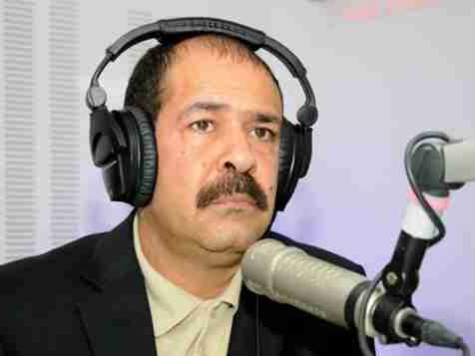
This morning’s key headlines from GenerationalDynamics.com
- Riots spread in Tunisia after popular opposition leader assassination
- Tunisia – the birthplace of the Arab Spring
- China: N. Korea ‘must pay a heavy price’ for third nuclear test
- S. Koreans debate pre-emptive strike on N. Korean nuclear site
- Japan considers modifying anti-war provisions of constitution
Riots spread in Tunisia after popular opposition leader assassination

Chokri Belaid during a radio interview in November
Long-term simmering tensions between secularists and Islamists inTunisia exploded into violence Wednesday, as word spread that apopular secular leader and outspoken government critic Chokri Belaidwas shot dead with three bullets fired from close range. Police firedtear gas at the thousands of protesters gathered outside the interiorministry in central Tunis to denounce the murder. It’s not known whois responsible for the murder, but protesters are blaming the rulingEnnahada party and its leader Rached Ghannouchi. Ennahada partyoffices were torched and ransacked in Tunis and in other cities,including Sidi Bouzeid, considered the birthplace of the Arab Spring.Tunisia’s government has collapsed for the time being, and oppositionparties are calling for a nationwide general strike to protest themurder. France 24
Tunisia – the birthplace of the Arab Spring
Over two years of turmoil throughout the Arab world, known as thewhen a street vendor, Mohamed Bouazizi set fire to himself in SidiBouzid in central Tunisia, in protest of the police confiscation ofhis vegetable cart. After days of clashes between protesters and thepolice, long-time dictator Ben Ali was forced to flee the country, andis currently in exile in Saudi Arabia. By January the clashes hadspread to Egypt, Yemen, Morocco and Lebanon, launching the ArabSpring. Tunisia’s current government is led by prime minister. HamadiJebeli, secretary general of the Ennahada party. The Ennahada partyis usually referred to as a “moderate Islamist” party, not asreligiously conservative as Tunisia’s Salafist parties, but opposed byTunisia’s secular parties. The secularists are blaming Ennahada andthe Salafists for the murder, but so far the perpetrator has not beenidentified. Daily Star (Beirut) and Reuters
China: N. Korea ‘must pay a heavy price’ for third nuclear test
According to state-run Chinese media, a third nuclear test by NorthKorea, which is considered by outside observers to be imminent, iscomplicating relations between China and North Korea. China hasstrenuously expressed its disapproval of North Korean nuclear testing,and has threatened economic sanctions if a third test proceeds. NorthKorea will pay a heavy price if it conducts a third nuclear test.Some fear the worst case scenario, that the rupture that occurred inrelations between China and Soviet Union will be repeated. But Chinawill not be taken hostage by North Korea’s intransigence, althoughChina and North Korea have a strong friendship. Global Times (Beijing)
S. Koreans debate pre-emptive strike on N. Korean nuclear site
Fears are increasing that North Korea’s imminently expectedthird nuclear test will be of a type that will allow NorthKorea to create a nuclear weapon small enough to be thenuclear warhead of a long-range missile, such as the missilethey recently tested. The South Koreans are weighing thepossibility of a pre-emptive strike on North Korea’s nucleartest site, although no such strike is planned at the currenttime. According to South Korea’s Defense Committee chairman,when told that a strike is possible if the situation changes:
“Are you sticking to your guns even if a pre-emptivestrike on the North’s nuclear weapons will lead to a full-scalewar? It would be better to destroy the North’s nuclear weaponsfirst than to be struck by them, given that that would lead to awar in any case.”
Japan considers modifying anti-war provisions of constitution
Japan’s Prime Minister Shinzo Abe is pushing a goal toreinterpret Article 9 of Japan’s post-war Constitution, in whichwar was renounced. The changes would be aligned withthe Japan-U.S. military alliance, and would permit militaryaction in four specific situations:
- To shoot down a ballistic missile flying over Japan possibly toward the United States;
- To defend U.S. military ships on the high seas that are engaged in joint operations with the Maritime Self-Defense Force;
- To defend allied troops in U.N.-led peacekeeping operations;
- To provide logistic support for U.N.-led troops using military force.
Public opinion now strongly favors such a constitutional change, whereit didn’t just three years ago. However, there is some parliamentaryopposition to the change. 76-year-old Yohei Kono, who lived throughWorld War II, says:
“I don’t think politicians understand the price wehave to pay if we are going to revise the Constitution orreinterpret Article 9. The Constitution has contributed to thepeace and regional stability of Japan since the war, which is whywe have not revised the Constitution even though creating our ownConstitution has been one of the LDP’s goals since the party waslaunched in 1955.”
According to Kono, the rightward shift in public opinion is occurringbecause so many of the current crop of lawmakers were born after WorldWar II and have no experience with the horrors of war — which isexactly the kind of point that Generational Dynamics makes. Japan Times
Permanent web link to this article
Receive daily World View columns by e-mail

COMMENTS
Please let us know if you're having issues with commenting.